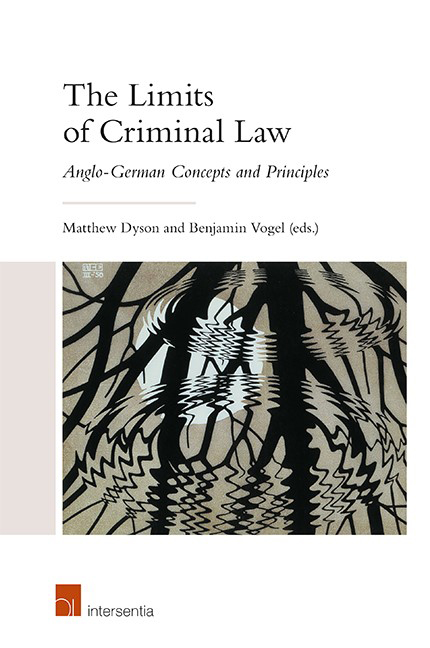Book contents
- Frontmatter
- Preface
- Contents
- List of Cases
- List of Abbreviations
- List of Contributors
- Chapter 1 Introduction
- PART I CORE PRINCIPLES OF CRIMINAL LAW
- PART II CRIME AND TORT
- PART III CRIME AND MEDICAL
- PART IV CRIME AND REGULATION
- PART V ADMINISTRATIVE SANCTIONS
- PART VI ALTERNATIVE ENFORCEMENT
- PART VII COUNTER-TERRORISM
- PART VIII CRIME AND INTELLIGENCE
- PART IX CONCLUSION
- Index
- About the Editors
Chapter 21 - Countering Terrorism at the Limits of Criminal Liability in Germany
Published online by Cambridge University Press: 11 February 2021
- Frontmatter
- Preface
- Contents
- List of Cases
- List of Abbreviations
- List of Contributors
- Chapter 1 Introduction
- PART I CORE PRINCIPLES OF CRIMINAL LAW
- PART II CRIME AND TORT
- PART III CRIME AND MEDICAL
- PART IV CRIME AND REGULATION
- PART V ADMINISTRATIVE SANCTIONS
- PART VI ALTERNATIVE ENFORCEMENT
- PART VII COUNTER-TERRORISM
- PART VIII CRIME AND INTELLIGENCE
- PART IX CONCLUSION
- Index
- About the Editors
Summary
This contribution deals with the expansion of criminal law in the field of terrorism and its expansion into other areas of law, especially into police law and the law of the intelligence agencies. This development has led to an overlap of substantive law and consequently procedural law. From the legislature's perspective, countering terrorism in substance mainly concerns how future harm by terrorists can be regulated most efficiently and in accordance with established criminal and constitutional standards.
INTRODUCTION
Terrorism legislation is by now common in Germany and the scope of terrorism offences, investigation powers and preventive strategies is constantly discussed across the political and legal spectrum. The latest ongoing wave of terrorism legislation began after 9/11, bringing with it a large number of changes in the German legal landscape. Yet neither experiences with terrorism nor terrorism legislation are new to Germany. The Red Army Faction (Rote Armee Fraktion2 (RAF)) triggered a first wave of legislation in the 1970s that brought many changes in substantive and procedural criminal law.
Terrorism is addressed in German legislation mainly through criminal law, police law and the law of the intelligence agencies, three areas that have traditionally been seen as clearly separate, with their own tasks and powers. Within the larger context of terrorism, the traditional borders of criminal law, police law and the law of the intelligence agencies have begun to vanish, and the different fields of law have begun to merge. Therefore nowadays terrorism is predominantly seen as part of an umbrella concept of internal security or homeland security (Innere Sicherheit), including all tasks of the state with regard to preventing harm to individuals and the state as well as to fighting crime. This new umbrella concept seeks to promote a comprehensive preventive strategy, marking a key shift from sector-based legislation.
Looking at the traditional scope of the three areas of law, a first line can be seen between criminal law being mainly repressive by sanctioning past behaviour, and police law/intelligence law being mainly preventive by preventing future harm. This distinction between criminal and police law goes back centuries. Since the Middle Ages, criminal law has been the task of the judiciary. whereas the police have acted as part of the executive power under a different set of rules.
- Type
- Chapter
- Information
- The Limits of Criminal LawAnglo-German Concepts and Principles, pp. 435 - 466Publisher: IntersentiaPrint publication year: 2020



